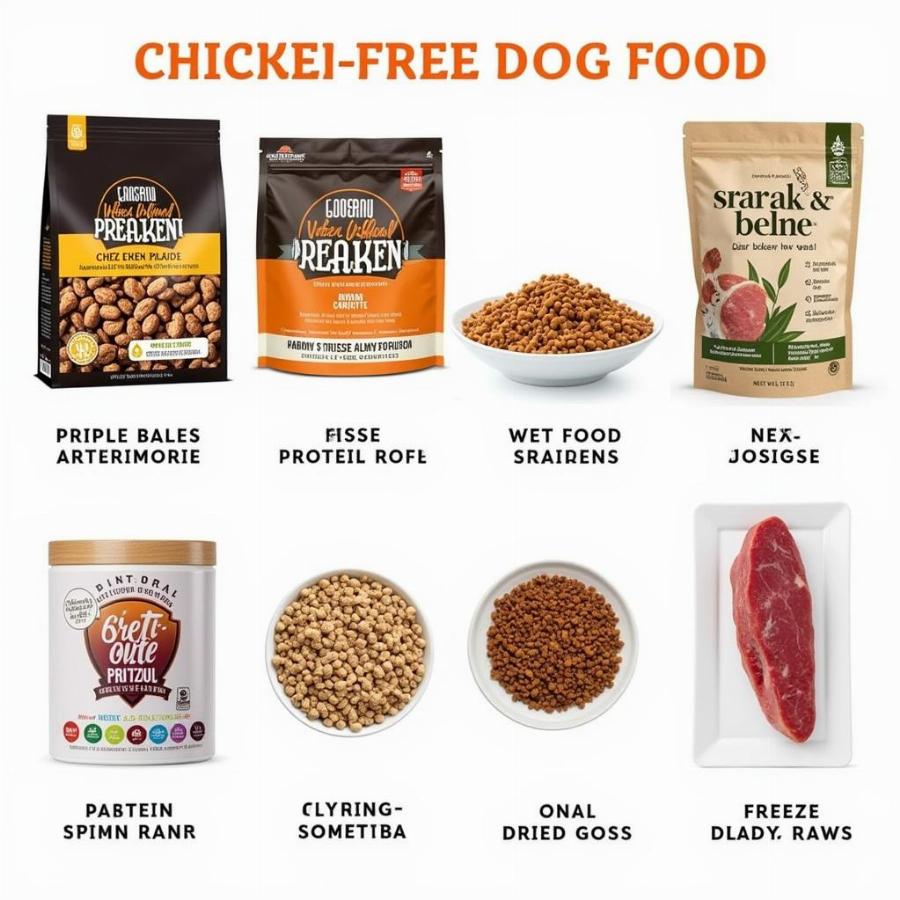Finding the right dog food can be tricky, especially if your furry friend has allergies or sensitivities. Many commercial dog foods use chicken as a primary protein source, leaving owners of chicken-sensitive dogs searching for alternatives. This guide will explore the world of chicken-free dog food, helping you understand why it’s necessary for some dogs and how to choose the best option for your pet’s needs.
Why Choose Chicken-Free Dog Food?
Chicken allergies are among the most common food allergies in dogs. Symptoms can range from mild skin irritation and itching to severe digestive upset and even anaphylaxis in rare cases. If you notice your dog experiencing these symptoms after eating chicken-based food, it’s crucial to consult a veterinarian to determine the cause and discuss potential dietary changes. Even if a true allergy isn’t present, some dogs simply have sensitivities to chicken that manifest as less severe but still bothersome symptoms like excessive shedding or chronic ear infections. Switching to a chicken-free diet can be a game-changer for these dogs.
 Chicken-Free Dog Food Options
Chicken-Free Dog Food Options
Exploring Chicken-Free Alternatives
Fortunately, there’s a wide array of chicken-free dog food options available on the market today. These formulas utilize alternative protein sources, such as:
- Beef: A palatable and readily available option.
- Lamb: Often recommended for dogs with sensitive stomachs.
- Fish (Salmon, Whitefish): Rich in omega-3 fatty acids, beneficial for skin and coat health.
- Turkey: Another poultry option, but sometimes suitable for dogs with mild chicken sensitivities. Always consult your vet.
- Venison: A novel protein source, often well-tolerated by dogs with allergies.
- Duck: Another novel protein, also rich in omega-3 fatty acids.
- Insect-based: A sustainable and hypoallergenic option gaining popularity.
- Plant-based: Suitable for vegan or vegetarian dogs, but requires careful formulation to ensure complete nutrition.
How to Choose the Right Chicken-Free Dog Food
Choosing the right chicken-free food involves considering your dog’s individual needs:
- Age: Puppies, adults, and seniors have different nutritional requirements.
- Breed: Larger breeds may benefit from joint-supporting ingredients.
- Activity level: Active dogs need more calories and protein.
- Specific health concerns: Look for formulas designed for digestive issues, skin sensitivities, or other conditions.
what is the best joint supplement for dogs
Reading the Label: What to Look For
Always check the ingredient list carefully. Look for:
- Named protein source: The first ingredient should be a specific protein source, such as “beef” or “lamb,” not just “meat.”
- Whole grains or digestible carbohydrates: Provide energy and fiber.
- Healthy fats: Support skin and coat health.
- Fruits and vegetables: Offer essential vitamins and minerals.
- Avoid artificial colors, flavors, and preservatives.
What dog food doesn’t have chicken in it?
Many brands offer chicken-free options. Look for formulas featuring beef, lamb, fish, venison, or other novel proteins.
Where can I find chicken-free dog food?
Most pet stores and online retailers carry a variety of chicken-free dog foods.
Transitioning to a New Food
Introduce the new food gradually over several days to avoid digestive upset. Start by mixing a small amount of the new food with the old food, gradually increasing the proportion of new food while decreasing the old.
Expert Insights
Dr. Emily Carter, DVM, emphasizes the importance of a proper diagnosis: “If you suspect a chicken allergy, it’s essential to consult your veterinarian. They can perform tests to confirm the allergy and recommend the best dietary approach.”
Sarah Miller, a certified canine nutritionist, adds: “Choosing a high-quality, chicken-free diet with a balanced nutritional profile is vital for your dog’s overall health and well-being.”
Conclusion
Choosing a dog food that does not contain chicken is a crucial step for managing chicken allergies or sensitivities. By understanding your dog’s needs and carefully selecting a suitable alternative, you can ensure they receive the necessary nutrients to thrive.
FAQs
- Is chicken-free dog food more expensive? Not necessarily. Prices vary depending on the brand and ingredients.
- Can I make homemade chicken-free dog food? Yes, but it’s important to consult a veterinary nutritionist to ensure a balanced diet.
- What are the signs of a chicken allergy in dogs? Common signs include itching, skin redness, digestive upset, and ear infections.
- Are there any treats that are chicken-free? Yes, many brands offer chicken-free treats made with alternative proteins.
- What if my dog doesn’t like the chicken-free food? Try different brands and flavors to find one your dog enjoys.
Related Articles:
- can dogs eat raw venison
- salmon oil and dogs
- pedigree vs nature's menu dry dog food
- dollar general hot dogs
Beaut Dogs is your trusted source for all things related to dog care, providing expert advice and comprehensive information to help you navigate the world of dog ownership. For personalized assistance in choosing the perfect chicken-free diet for your furry companion, please contact us at Email: [email protected]. We’re here to help!